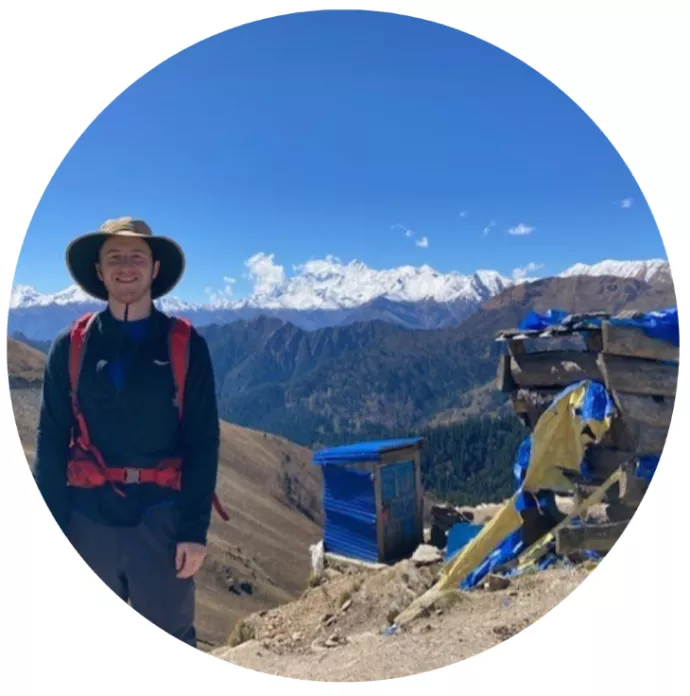
CPS Grad Spotlight - Josh Wolpert
Name: Josh Wolpert
MSc or PhD Candidate: PhD Candidate
Location of Undergraduate Education: M.S. in Geology, Louisiana State University & B.A. in Geosciences, Hamilton College
Name of the Lab at CPS: Schoenbohm Lab
Selected Research Contributions:
Google Scholar: https://scholar.google.com/citations?user=oM2bONUAAAAJ&hl=en&oi=ao
LinkedIn: https://www.linkedin.com/in/josh-wolpert-09b378111/
Josh, please tell us about yourself and your journey as a PhD Candidate!
How did you come to UTM? What interested you to join a lab here?
I came to UTM to work with Dr. Lindsay Schoenbohm. Her work is well known in the tectonic geomorphology field, and I reached out about opportunities in her group. Dr. Schoenbohm had funding for a project in Nepal (which is kind of the dream for a budding earth science researcher), and we met at a conference to discuss potential project details. I had also heard very positive things about Dr. Schoenbohm’s character, which I think is important for prospective students to consider. Another draw to coming to UTM was the prospect of living in Toronto. UofT is a great place for someone who feels comfortable in large vibrant cities, and the shuttle bus that transports students between the St. George and UTM campuses allows UTM students flexibility in where to live.
When did you realize that you wanted to pursue a graduate study?
I first started thinking about graduate programs while doing research during the third year of undergrad. This experience exposed me to the investigatory lens through which scientists view the world and the sophisticated methods rooted in basic chemistry and physics that allow us to solve these scientific mysteries. I was a curious student, and the prospect of contributing to the scientific community was very attractive.
What are your research interests? Tell us few exciting things about your research.
I study why landscapes look the way they do, and I tend to focus on mountainous terrain. I ask questions like: ‘Why is that part of a mountain range pointier than that other part of a mountain range?’. It all boils down to factors that influence rates of topographic growth and decay, and we can model these processes to create synthetic terrain and try to understand the impacts of different factors. But, these models can be pretty complicated and tough to parameterize. Furthermore, each study area is unique and the product of millions of years of processes that may be non-existent today or operate too slowly or infrequently for us to detect them. We turn to field and satellite data to understand the essential ‘ingredients’ that have created landscapes, and we try to interpret the role of each ingredient within the confines of preexisting theory. Sometimes we discover new concepts that alter how we view landscapes and improve theory! A good chunk of my graduate work has involved understanding the role of climate cyclicity in landscape evolution. If climate forcings are cyclical, is it really appropriate to approximate them as constant when interpreting landscapes? I’m excited to share details with the community!
What is your goal when you finish your degree?
I’d like to continue addressing questions in the earth sciences, with a focus towards human impact. I think this is particularly relevant as we continue having to adapt to consequences of climate change. I’d also love to continue the type of computational work I’ve picked up during graduate school, whether that’s in academia or industry.
What are some of your achievements you'd like to share?
The University of Toronto Men’s Varsity Squash team placed third at the Ontario University Athletic championships this year after two second place finishes in 2022 and 2023… I’ve found getting involved with activities outside of research to be extremely beneficial to enjoying the graduate experience and avoiding burnout.
Do you have any advice for students considering to pursue graduate studies in research?
Find what makes you curious. Graduate research is long and requires a great deal of responsibility, so you want to choose an area that excites you.
There will be difficult periods when projects move slowly or fail to pan out, but be kind to yourself. It’s a long process. Go for a run, see a movie, take a break. Eat a pint of Ben and Jerry’s.
Lastly, take control of your research and get what you want out of it. Grad school is a great opportunity to pick up new skills, but you need to be proactive in learning.
